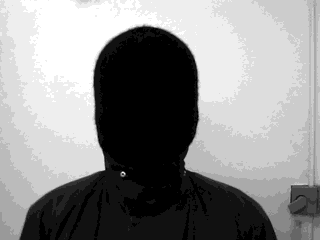Some friends asked me to write about one of my projects for their publication. It should have been straightforward, but they said I couldn't write about myself in the first person. Since I was too lazy to write a thoughtful piece about myself, I simply cloaked myself in an artistic cliché. Subvert the dominant paradigm.
--Earth First! bumpersticker
David Glenn Rinehart stole his aesthetic credo from an Earth First! bumpersticker. It is not surprising; he was, after all, trained as a thief, as a photographer. (There is no innocent explanation for the act of photography: it almost always is taking pictures.)
A picture here, an idea there ... it was the beginning of a successful criminal career in the arts. By all accounts, though, Rinehart was and still is a petty criminal: an image here, a concept there. When he met the major arts career criminals--the publishers, gallery owners and other members of the organized art crime syndicate--Rinehart was out of his league. And he knew it.
Rather than play a losing game with the art cartel, Rinehart has set up his studio on unclaimed turf: the Internet. (There really is honor among thieves.) The move to the Internet was undoubtedly a move of convenience--never underestimate the slothfulness of an artist--but it was also a logical progression. The tens of thousands of pages of work Rinehart has produced in the last few years are on a magnetic disk the size of a small doughnut. And now that doughnut is connected to tens of millions of computers around the world.
Rinehart's digital studio, Studio 2020, is available to anyone with Internet access to the World Wide Web. There, a visitor may browse through his notebook, view work designed specifically for the Internet, and leave messages.
Rinehart explained the premise of his experiment over improbably large glasses of whiskey. "I can show you everything I've created in the last few years on this notebook computer. I should be able to give everyone the same access to my studio over the Internet." (I may be oversimplifying his arguments, but no more complex thoughts could have survived the whiskey vapors.)
And what about the name? "I called it Studio 2020 instead of, say, Rinehart's Studio de la Net because Studio 2020 looks much better on grant applications."
I am skeptical of the concept of a perpetually open studio, very skeptical of the Internet as a publishing medium, and entirely skeptical of Rinehart. From whom did he steal this idea? Despite my reservations, though, Studio 2020 is an interesting experiment. Whatever results it yields will be of little consequence, but the questions about producing art for and disseminating work over the Internet should be a catalyst for much discussion and debate in the years ahead.
What more could a thief want than unlocked doors?
--Paul C. d'Charmmér
